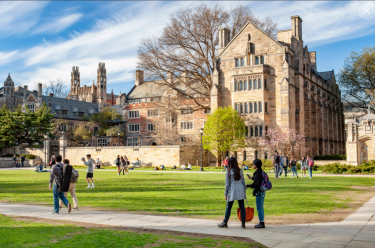
“So, you go into Yale, now you can begin to experience rejection!” warns Rachel Shin in The Atlantic.
Arrow Zhang came to Yale last fall eager to try new things. In high school, she had spent most of her free time writing and practicing piano, but at Yale, she envisioned dividing her time between activities as disparate as finance and international relations. Zhang did not anticipate how competitive Yale’s clubs would be.
She quickly learned that, not unlike the admissions process to the university itself, entrance to student clubs often requires written applications and interviews. She filled her Google Calendar with hours of info sessions and application tasks. After more than a month of nonstop auditions, applications, interviews, and even tests, Zhang found herself rejected from multiple clubs, including ones that had no obvious reason to be selective. Most of the clubs she was able to join—The Yale Herald, a dance group, the clock-tower bell-ringers —involved skills she’d already honed in high school.“Everyone would say, You don’t need any experience to apply,” she said. “But then everyone who gets in are already pros.”
Yale’s competitive-admission clubs include many that are notoriously exclusive but also more surprising entries, such as the community-service club. One of Zhang’s rejections came from the Existential Threats Initiative, which meets to discuss issues such as climate change and AI. Zhang was turned away for not having enough experience dealing with existential threats. Her rejection email encouraged her to listen to more podcasts, such as 80,000 Hours (tagline: “In-depth conversations about the world’s most pressing problems”) or otherwise gain expertise in the field.
Ben Snyder, a recent Yale grad who co-founded Existential Threats in 2022, told me the club is simply not for beginners.
“We wanted to be more selective so we could have more advanced conversations,” said Snyder, whose expertise in this subject includes having researched the risk potential of pandemics at the Stanford Center for International Security and Cooperation last summer.
High barriers to entry are no longer just for historically elite groups on campus like secret societies and the acapella group the Whiffenpoofs, or even for club sports teams, which can field only so many players. The investing club turned away 236 people last year. The “teach kids to code” club turned away 20. The musical-improv group turned away several dozen, leaving its rejectees to find more loosely organized ways to burst into song. Half of the applicants to the magic club saw their hopes vanish into thin air.





OneGuy
To paraphrase Groucho Marx I wouldn’t want to belong to a club that wanted me. I went to college and more and never once thought I think I’ll join a club. But I was in STEM and didn’t have time for clubs. But seriously, who joins clubs and why? Are they lonely?
ruralcounsel
Just an indication that the Yale academics are not challenging enough. The clubs at MIT (back in my days) were begging for members to join and I can’t imagine anyone being turned away. Because it took so much effort just to keep up with your classes, people didn’t have much free time, and used it sparingly and with a lot of discernment.
People didn’t join clubs to pad a resume.
And climate change an existential threat? Seriously? Those people have failed the gullibility test. I guess they can qualify for the Stupid Club.
PDS
Believing climate change is an existential threat (or pretending to convincingly) is required to be a member of the professional managerial elite.
I would bet anyone who expressed any reservations about anthropomorphic climate change would be found to not be Yale material in the first place.
PolyTrack
This phenomenon is not unique to Yale; many elite institutions have created cultures where participation in student life itself requires high achievement, not just interest.
Please Leave a Comment!